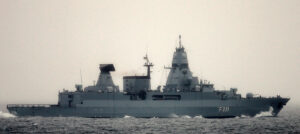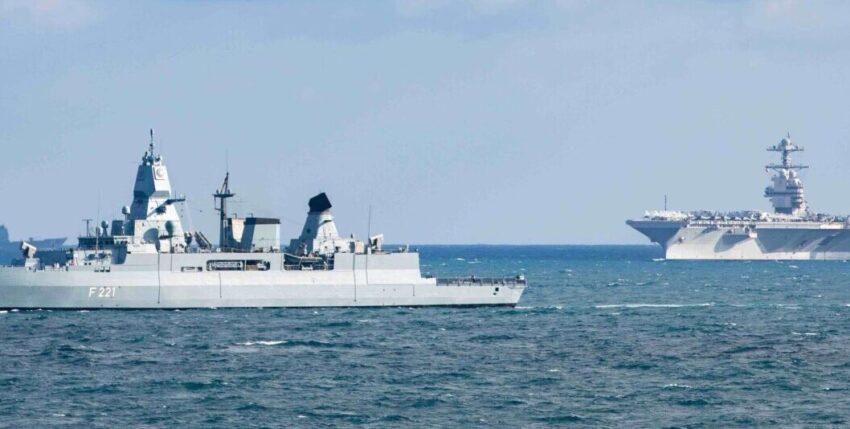19 February: Launch of the EU maritime mission in the Red Sea?
marineforum.online had already reported on 23 January 2024 on the decision-making process and funding position regarding an EU-led naval mission.
Here are further developments
Aspides, the EU naval mission in the Red Sea, cleared another hurdle this week. At the informal meeting of defence ministers, a decisive course was set. "Our aim is to set up and launch Operation Aspides by 19 February at the latest. And I am certain that we will do so," said Josep Borrell at the end of the informal EU Council of Defence Ministers on 31 January 2024.
National contributions
According to the Brussels High Representative, the member states are strongly in favour of the EU mission to protect merchant shipping in the Red Sea from attacks by the Yemeni Huthi. Seven EU countries are prepared to provide ships or aircraft for the mission. The French frigate "Languedoc" is already on site under national command. The same applies to her Italian FREMM-class sister "Virginio Fasan". Belgium has agreed to deploy the frigate "Louise Marie". The Dutch frigate "HNLMS Tromp" could at least be associated with the EU mission on its world tour - planning is underway and the parliamentary process has been initiated. The frigate "Hydra" from Greece is to join the European organisation in the Red Sea. Germany will send the frigate "Hessen".
Command and control
While the provision of forces for at least three units at the same time is shaping up very favourably, there is still no consensus on the choice of operation headquarters (OHQ). Greece has thrown its Joint Force Command South Centre based in Larissa into the ring. Five other national EU command centres in Germany (Ulm), France (Paris), Italy (Rome), Spain (Rota) and - occasionally - in Poland (Krakow) are available outside Brussels for the military-strategic planning, command and control of EU operations. According to reports, the Greek offer seems to have met with approval, whereby a Greek leadership with a French deputy could crystallise. However, a decision would then still have to be made on command at sea. The tried and tested model is a force command that rotates between the participating nations on board one of the units at sea. This would reduce the risk of the Houthis turning against European partners among the Arab nations, which would have to be taken into account if a headquarters were to be set up in Abu Dhabi or Djibouti.

"Hessen" as the German entry in the first rotation
Germany has earmarked the frigate "Hessen" for the launch. In view of the Bundestag calendar, parliamentary discussion could not take place until the week of 19-23 February. However, the frigate's departure date could be as early as 8 February. The background to this is that the German Navy wants to have this frigate available in the sea area as soon as the mandate from the German Bundestag is available. "The German Navy is ready to participate in the EU-Operation Aspides to protect merchant shipping in the Red Sea," said Vice Admiral Jan Christian Kaack, Inspector of the Navy, in an interview on bundeswehr.de. "We have to assume that the operation in the Red Sea will be a "fierce battle". ... From everything you see there, only a ship that can assert itself in terms of its armament will be considered. And whose crew is 100 per cent trained to deal with this threat." And elsewhere: "We can only send the best units there, and we only have three of them. In this respect, we also have to be a bit economical with our forces." The navy wants to take part in the military operation in the Red Sea for a few months. Vice Admiral Kaack: "And we are also prepared to contribute for a certain period in the second half of the year."
The EU on security policy paths
At the Brussels consultations, there was agreement on the purely defensive nature of Aspides. Borrell: "Under no circumstances will we start combat operations against Yemeni soil." Everyone seems to be in favour of an independent operation - even with an ambitious timetable. Borrell expressed his satisfaction at the press conference: "I think that in the end it will be "no hay mal que por bien no venga", as they say in Spanish. Everything bad also has something good. After all, we have created an ad-hoc mission with all these skills."
... and that takes time ...
This cannot hide the fact that the Europeans are taking a long time to come to a decision, let alone take action. The Houthis began their attacks on civilian shipping in the Bab-el-Mandeb on 19 November 2023 with the hijacking of the Galaxy Leader. On 18 December, Washington announced its Operation Prosperity Guardian, under which it is acting in a coalition with friendly nations against armed attacks at sea. European nations are taking part. France, Italy and the United Kingdom are represented - albeit under different leadership constructs. The Danish frigate "Iver Huitfeldt" left its home base on 29 January to take part in the US-led Operation Prosperity Guardian from mid-February.
Expandable
Aspides is an opportunity for the EU to act as a security architect in the maritime domain as well. The EU has built up expertise, infrastructure and diverse relationships in the Arab region from its Atalanta and Agenor missions. This could be built upon. And it could do much more if it could adopt a more holistic approach to crisis management and peacebuilding. And not just unilaterally, but in coordination with transatlantic allies. But that would probably be two steps too far ahead again!
Reality check
So for the time being, the economic giant that is the EU remains a lightweight in terms of security policy. Also to the detriment of its members. In this specific case: European shipping companies dominate the global market. Four of the ten largest container shipping companies are European: in 2023, they operated 2360 ships out of 3632. They are directly affected by the attacks in the Red Sea and the lengthening of transport routes.
Back to Aspides: The final decisions could now be taken on 19 February 2024 in the Foreign Affairs Council (formal meeting of foreign ministers).








